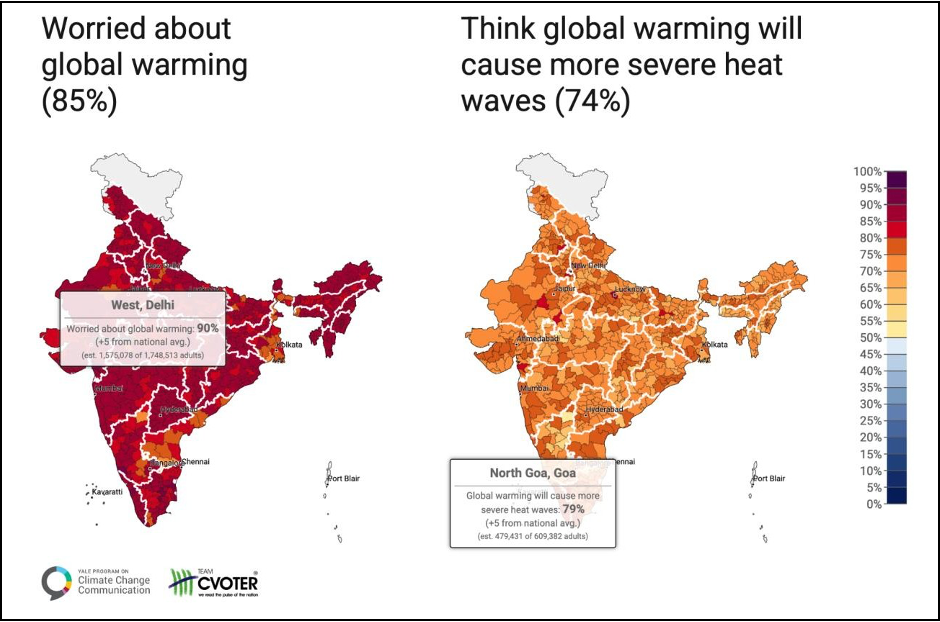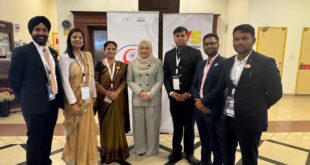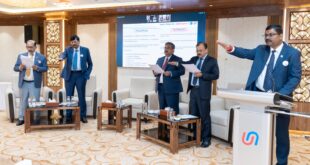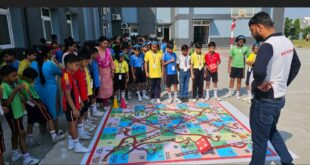 Dr.Seema Javed
Dr.Seema Javed
@seemajaved
The Yale Program on Climate Change Communication, in collaboration with C-Voter, has released the Yale Climate Opinion Maps for India. This interactive tool provides the first-ever estimates of public responses to climate change in 34 of India’s 36 states and union territories, and in 604 districts, depicting the variation in global warming knowledge, beliefs, risk perceptions, and policy preferences at state and local levels across the country. The survey indicates that large majorities in India are worried about a variety of climate-related hazards, including severe heat waves (85%), droughts and water shortages (85%), and severe cyclones and floods (76% and 71%, respectively).

Prior studies of public responses to climate change in India have often provided results only at the national level. For example, our recent national survey in India found that large majorities in India are worried about climate-related hazards, but until now we had little information about the diversity of climate opinions within the country. while national data show that 41% of people in India say they know a lot or something about global warming, there is substantial geographic variation within the country. In Gujarat, 52% of Indians know a lot or something about the issue, whereas in Maharashtra, only 33% report this level of knowledge. More Indians living in state capital cities say they know a lot or something about global warming compared to other districts.
“In a large and linguistically diverse country such as India, state governments and district administrators are more directly connected to the people and play a crucial role in achieving India’s development and climate action goals. This research can help state and local leaders tailor their climate change communications to meet the needs and aspirations of their communities,” said Dr. Jagadish Thaker, Senior Lecturer, University of Queensland.
After being given a short definition of global warming, the analysis and maps show that more Indians perceive risks from global warming in places like Kerala, Goa, and Punjab, compared to states such as Karnataka and Tamil Nadu.

Uttarakhand
The state of Uttarakhand is one of the most ecologically sensitive and climate vulnerable states in India. In recent years, the state has experienced extreme heat, extreme rainfall, and recurring landslides, all exacerbated by climate change. To better understand how the residents of Uttarakhand are perceiving the effects of climate change, the Yale Climate Opinion Maps for India provide estimates of public responses to climate change across the state and its districts depicting the variation in global warming knowledge, beliefs, risk perceptions, and policy preferences at the local level.
Just over half (54%) of Uttarakhand’s respondents know a lot or something about global warming. Zooming into this data at the district level, the maps find that in every district of Uttarakhand with the exception of Dehradun, Nainital, and Haridwar (districts surrounding major urban centers), less than half of the population reported knowing a lot or something about global warming. However, after being given a short definition of global warming, an overwhelmin majority of residents in every district of Uttarakhand say they have personally experienced its effects.
While a large majority (85%) of people in Uttarakhand believe that global warming is happening (after being given a short definition of it), only 58% think it is “caused mostly by human activities” rather than “natural changes in the environment”. Thus, there is a large gap between public understanding of the causes of climate change and the international scientific consensus, which
unequivocally attributes global warming to human activities.
A better understanding of public climate change knowledge, beliefs, risk perceptions, and policy support can help decision-makers in India and beyond. As Indian states develop or update their respective State Action Plans on Climate Change and Net Zero targets, understanding and engaging the public will be critical to effective implementation of Indian climate solutions.
A better understanding of public climate change knowledge, beliefs, risk perceptions, and policy support can help decision-makers in India and beyond. As Indian states develop or update thei respective State Action Plans on Climate Change and Net Zero targets, understanding and engaging the public will be critical to effective implementation of climate solutions.
In addition to Jennifer Marlon and Jagadish Thaker, researchers included Emily Goddard, Anthony Leiserowitz, Seth Rosenthal, and Jennifer Carman at Yale University, Liz Neyens, Naga Raghuveer Modala at Texas A&M Forest Service, Swetha Kolluri, d-coop, and Yashwant Deshmukh and Gaura Shukla at C-Voter.
(Environmentalist &A communications professional in the field of Science ,climate and energy.)
 Jubilee Post News & Views
Jubilee Post News & Views





